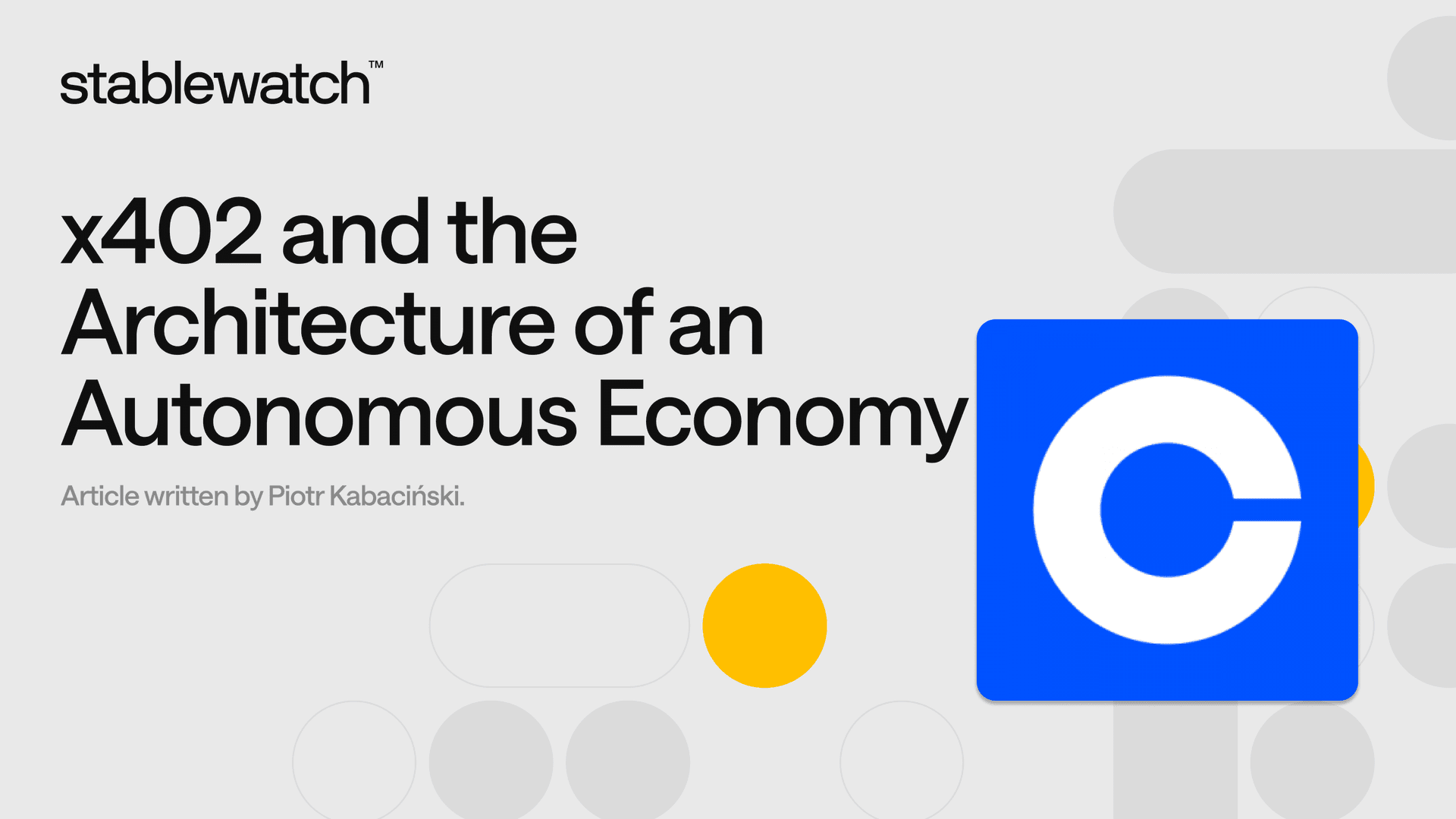Research
Stay ahead of the evolving stablecoin landscape with our curated insights.
More Articles
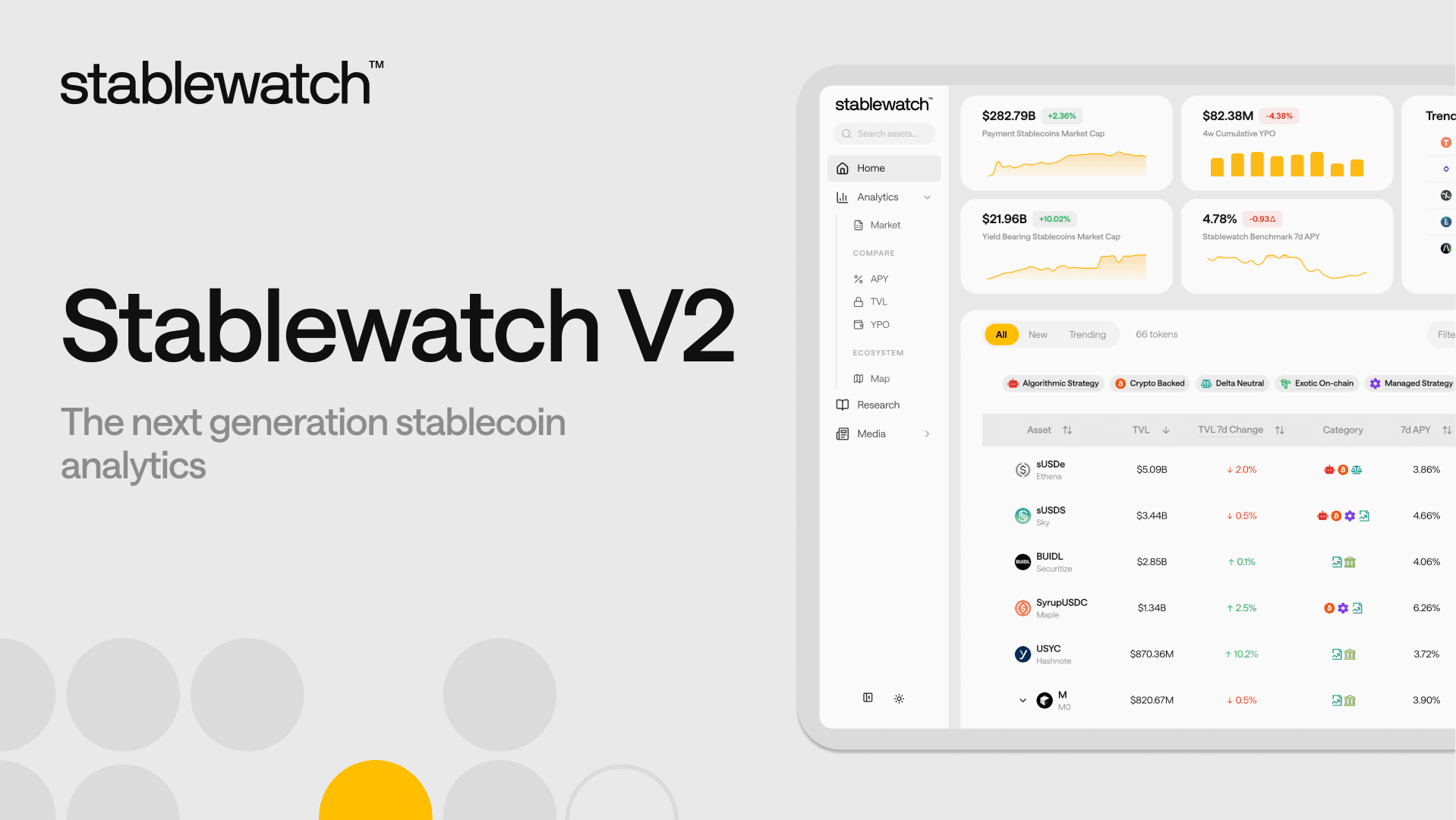
Stablewatch V2: The next Generation Stablecoin Analytics
The Yield-Bearing Stablecoin (YBS) market has fundamentally evolved into a complex, multi-billion dollar ecosystem. Navigating this landscape today demands more than simple APY trackers; it requires a sophisticated, data-driven framework. To accommodate for the growing complexity of this market, we are launching a major evolution of the stablewatch.io analytics platform. Our new dashboard builds upon the robust analytical foundation, redesigned as a comprehensive command center engineered to he


GPU-Backed Credit: How USD.AI Channels Onchain Capital for AI Compute Financing
Executive Summary The USD.AI protocol marks a significant architectural evolution in decentralized finance, establishing the "InfraFi" paradigm to bridge onchain liquidity with the capital-intensive world of artificial intelligence compute. Its design is a direct response to a dual-sided market needs: the AI industry’s insatiable requirement for rapidly deployed capital, set against the DeFi ecosystem’s search for sustainable, non-reflexive yield sourced from tangible economic activity. USD.AI


Project Spotlight: Decentralized USD
USDD 2.0: From Tron to Ethereum and Beyond Launched in May 2022 by the TRON DAO Reserve (TDR), Decentralised USD (USDD) began as a hybrid algorithmic stablecoin. However, in a strategic response to historical skepticism surrounding algorithmic models the project underwent a significant restructuring in January of 2025 which brought a pivot toward an Over Collateralised Decentralised Stablecoin (OCDS) architecture. This allowed USDD, rebranded as USDD 2.0, to be underpinned by the battle tested


The Crypto Payment Card Market: An In-Depth Analysis of its Role in Bridging Digital Assets and Global Commerce
Explore how crypto payment cards bridge digital assets and global commerce, using stablecoins, custodial vs non-custodial models, and fintech.

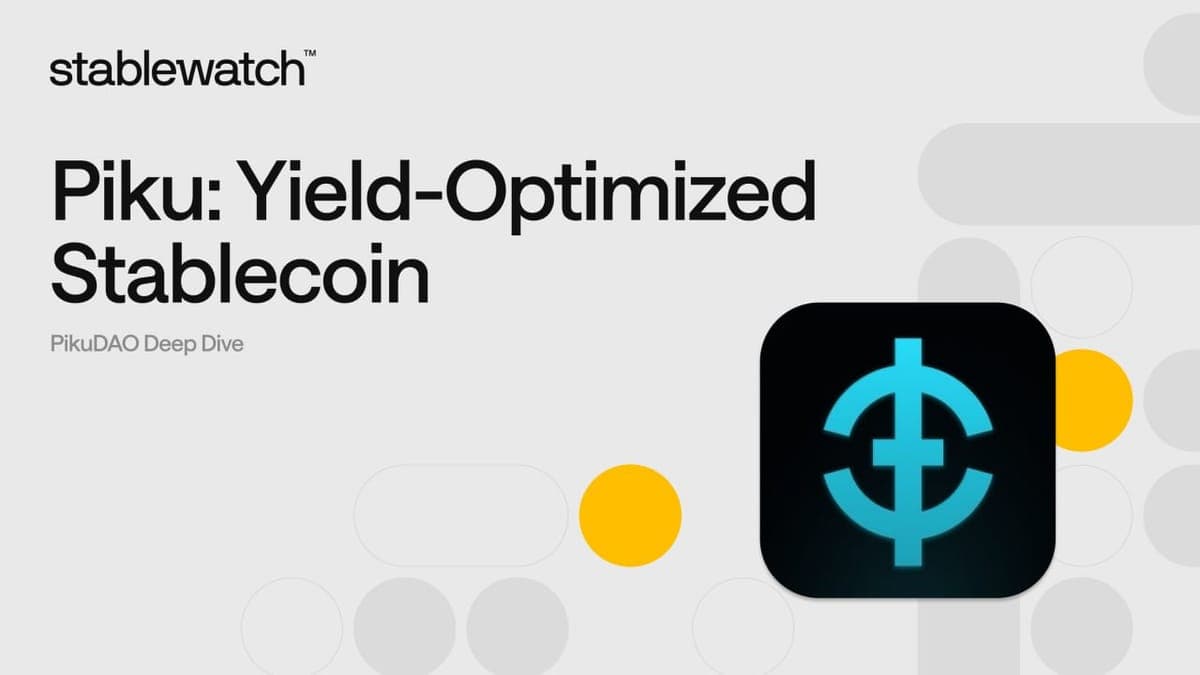
Piku: Yield-Optimized Stablecoin
TLDR * Piku operates a yield-optimized stablecoin where USP appreciates in value rather than maintaining a fixed $1 peg, with backing deployed across a proprietary FX arbitrage strategy (50%) and six DeFi protocols (50%) * The BMMF Turkey FX Arbitrage Strategy executes 2-3 delta-neutral trades daily in Turkish cryptocurrency markets, capturing crypto and traditional spreads in addition to the overnight interest rates while maintaining zero currency exposure through hedging * USP minting requ

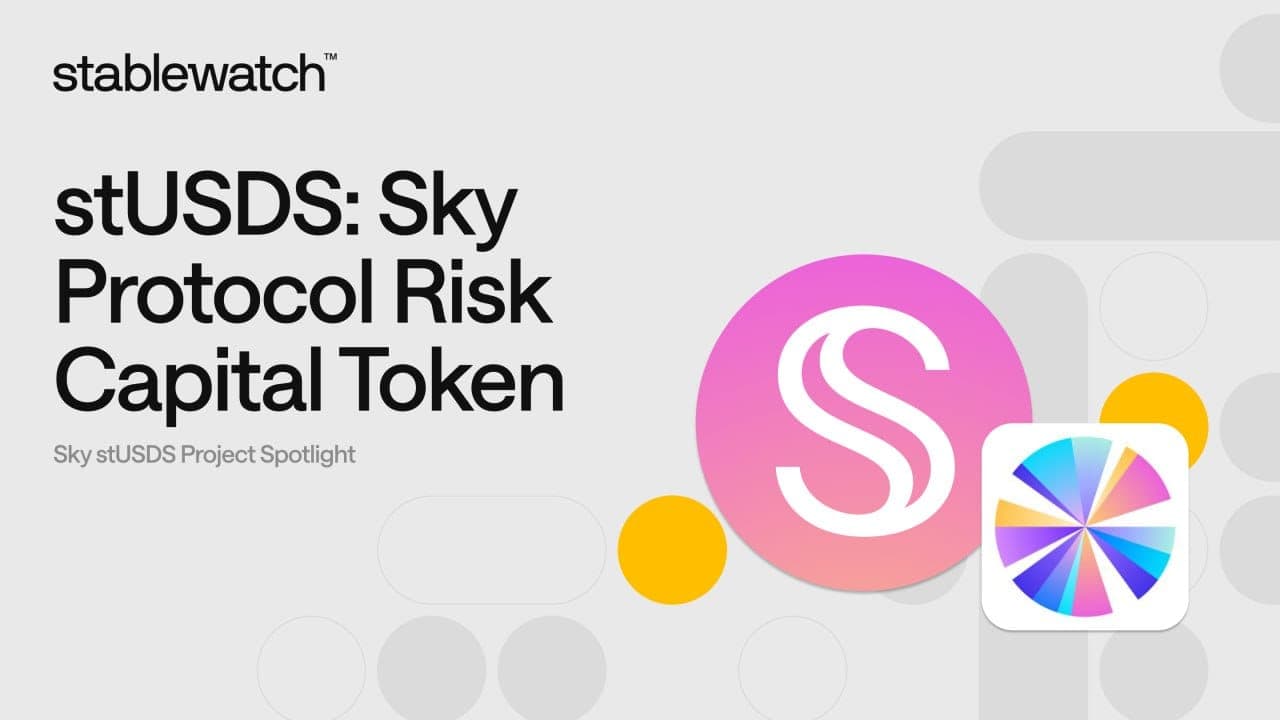
stUSDS: Sky Protocol Risk Capital Token
stUSDS The Sky ecosystem has introduced stUSDS, a new risk capital token designed for more expert users who wish to provide specialised liquidity for SKY-backed borrowing operations. This token represents a fundamental component of the Sky lending infrastructure, creating an isolated capital pool that funds leverage activities within the ecosystem. Core Function stUSDS serves as the dedicated lending capital for the SKY Staking leverage system. Users deposit USDS into the stUSDS contract and

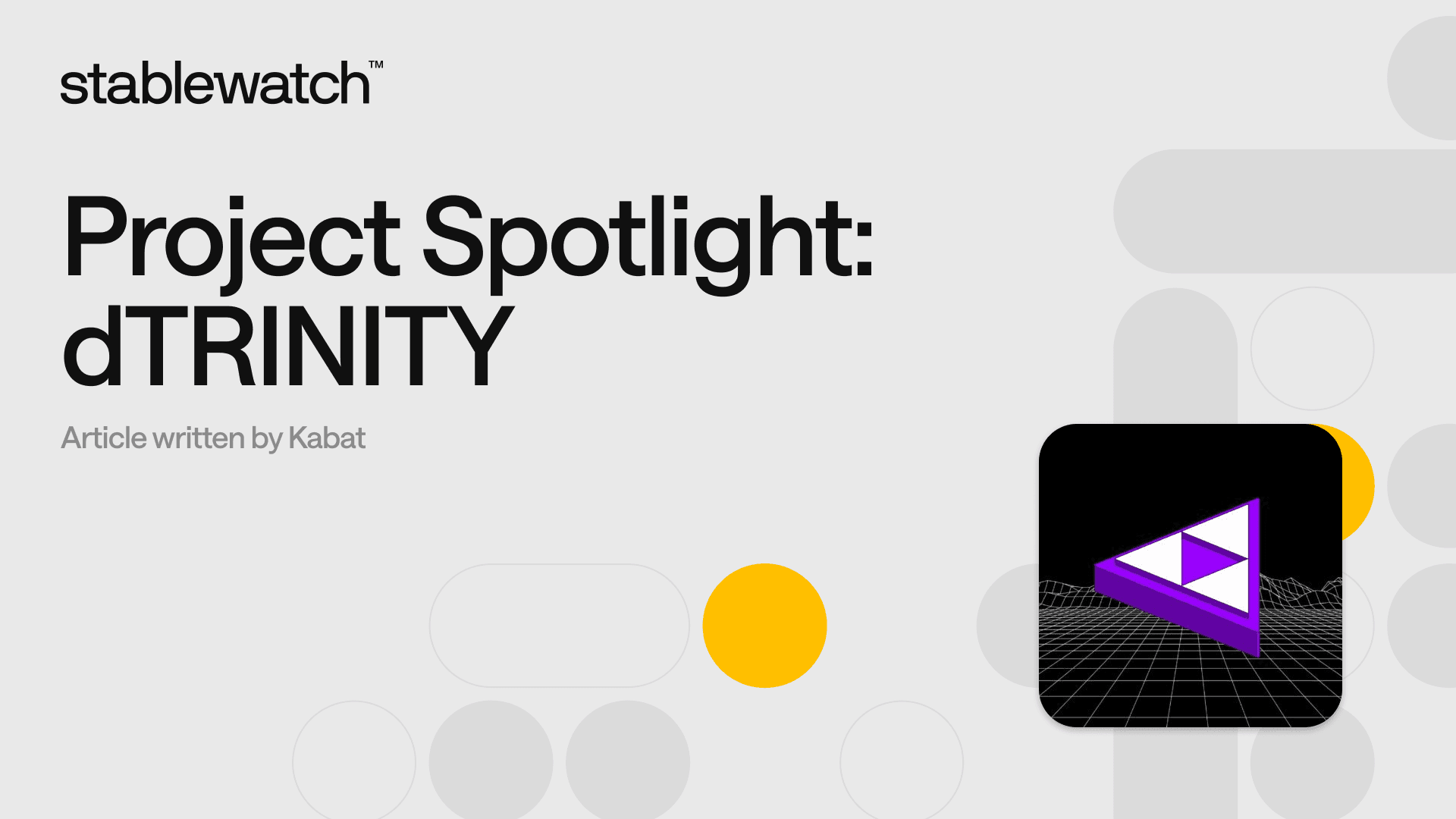
Project Spotlight: dTRINITY
The Search for Sustainable Yield The decentralized finance (DeFi) lending sector, a cornerstone of the on-chain economy, has long navigated fundamental economic tradeoffs. To attract liquidity, protocols must offer competitive yields to lenders; yet, to stimulate borrowing and protocol usage, they must provide low interest rates to borrowers. Historically, bridging this gap has most often relied on inflationary token rewards, creating a cycle of mercenary capital and questions around long-term


Interview with Cian, Founder of Keel
Exciting times in the world of Solana DeFi, as today I have the pleasure and privilege to introduce to you Cian, founder of Matariki Labs, contributors to Keel. 1. Cian could you please in short describe what you have built at Keel? Keel is an onchain capital allocator, focused on unlocking scale for Solana’s DeFi and Tokenized Asset markets. As a ‘Star’ in the Sky (formerly MakerDAO) Agent Framework, Keel is empowered to support onchain credit creation at scale, with the goal of expanding an

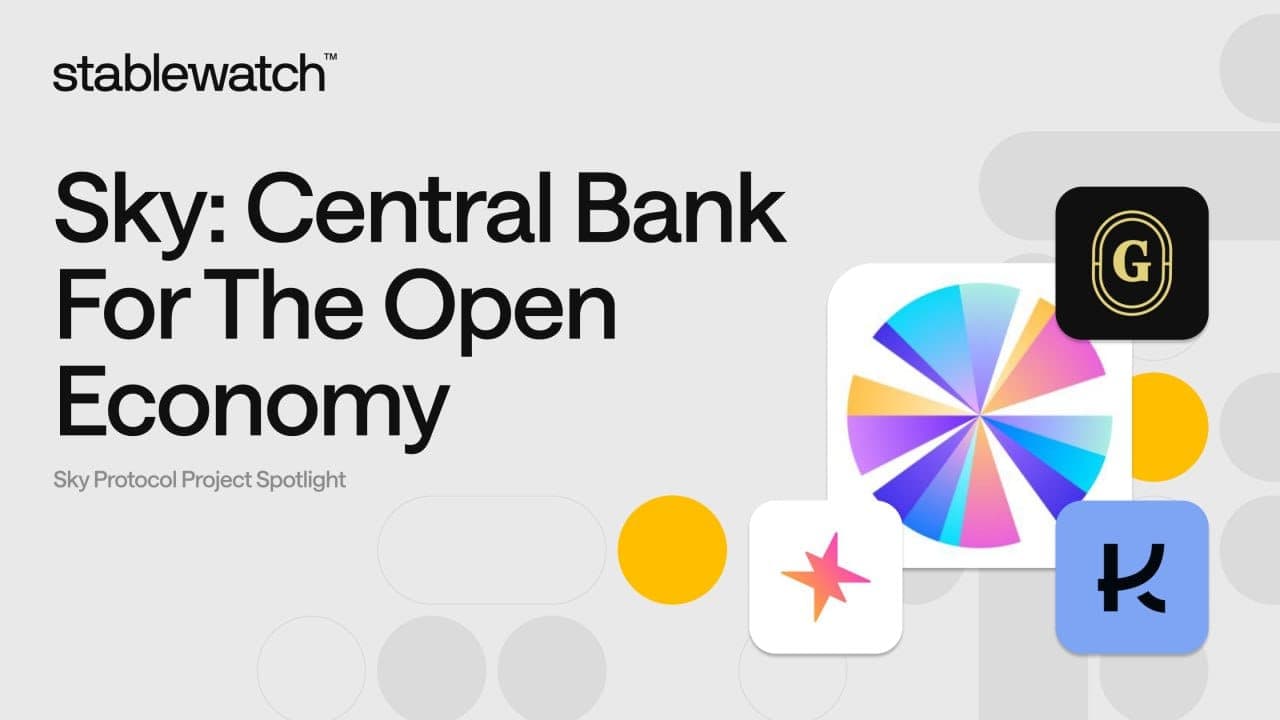
Sky Protocol: A Central Bank For The Open Economy
Introduction Central banking has undergone three centuries of evolution, from the Bank of England's 1694 founding as a wartime government financier to today's sophisticated institutions managing monetary policy and nationwide financial stability. The Bank of England established the foundational public-private hybrid structure, pioneering exclusive banknote issuance and systematic capital mobilisation. The 19th century introduced the lender of last resort function in central banks, followed by t

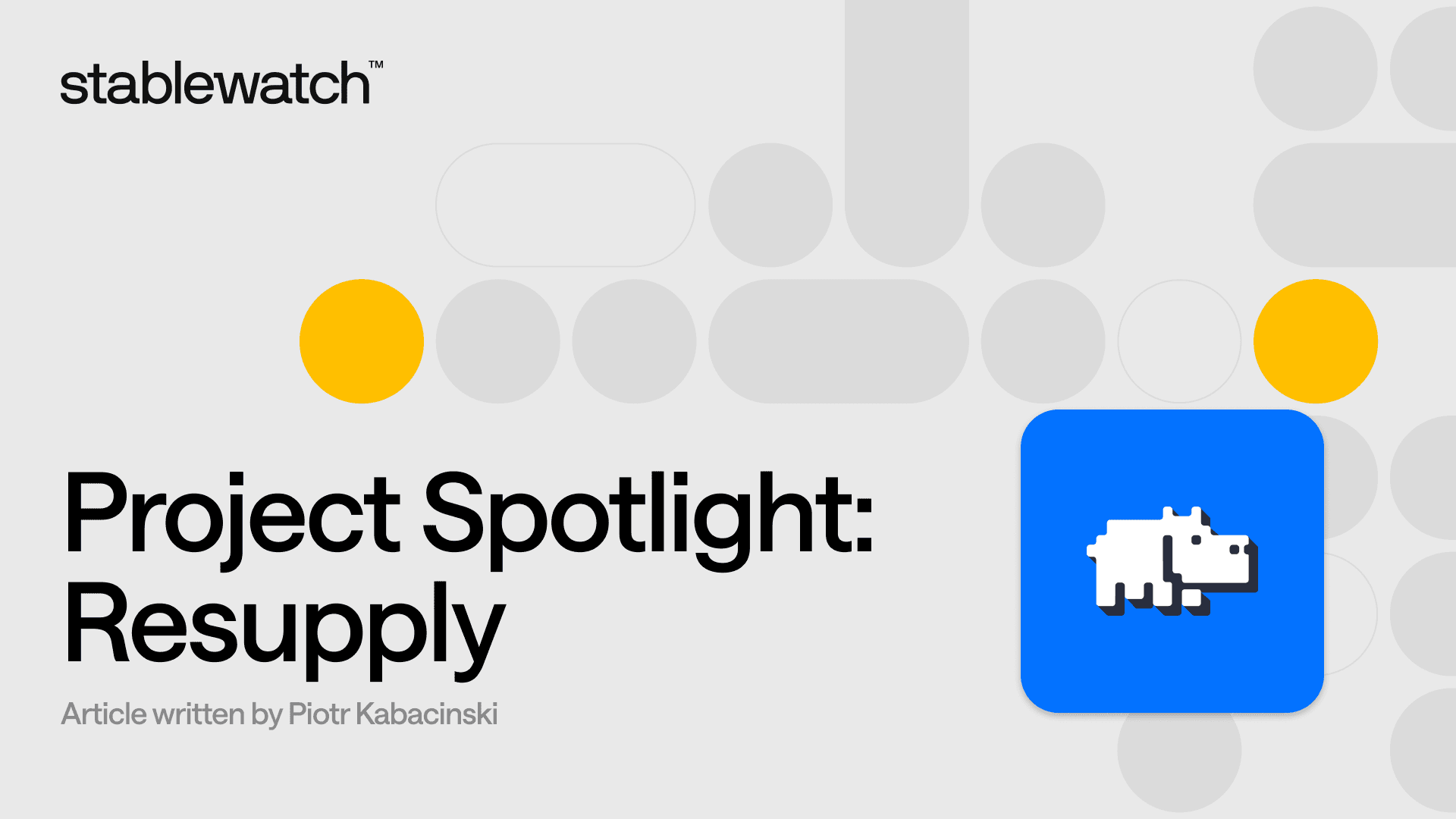
Project Spotlight: Resupply
The Quest for Capital Efficiency Decentralized Finance (DeFi) exists as a global competitive arena where the relentless pursuit of higher yields and capital efficiency dictates the flow of assets. In this environment, the most successful protocols are those that enable the capital to be as productive as possible. Yet, for much of DeFi’s history, a fundamental inefficiency has persisted: the opportunity cost for locked capital. Foundational DeFi protocols often force a binary choice upon users.

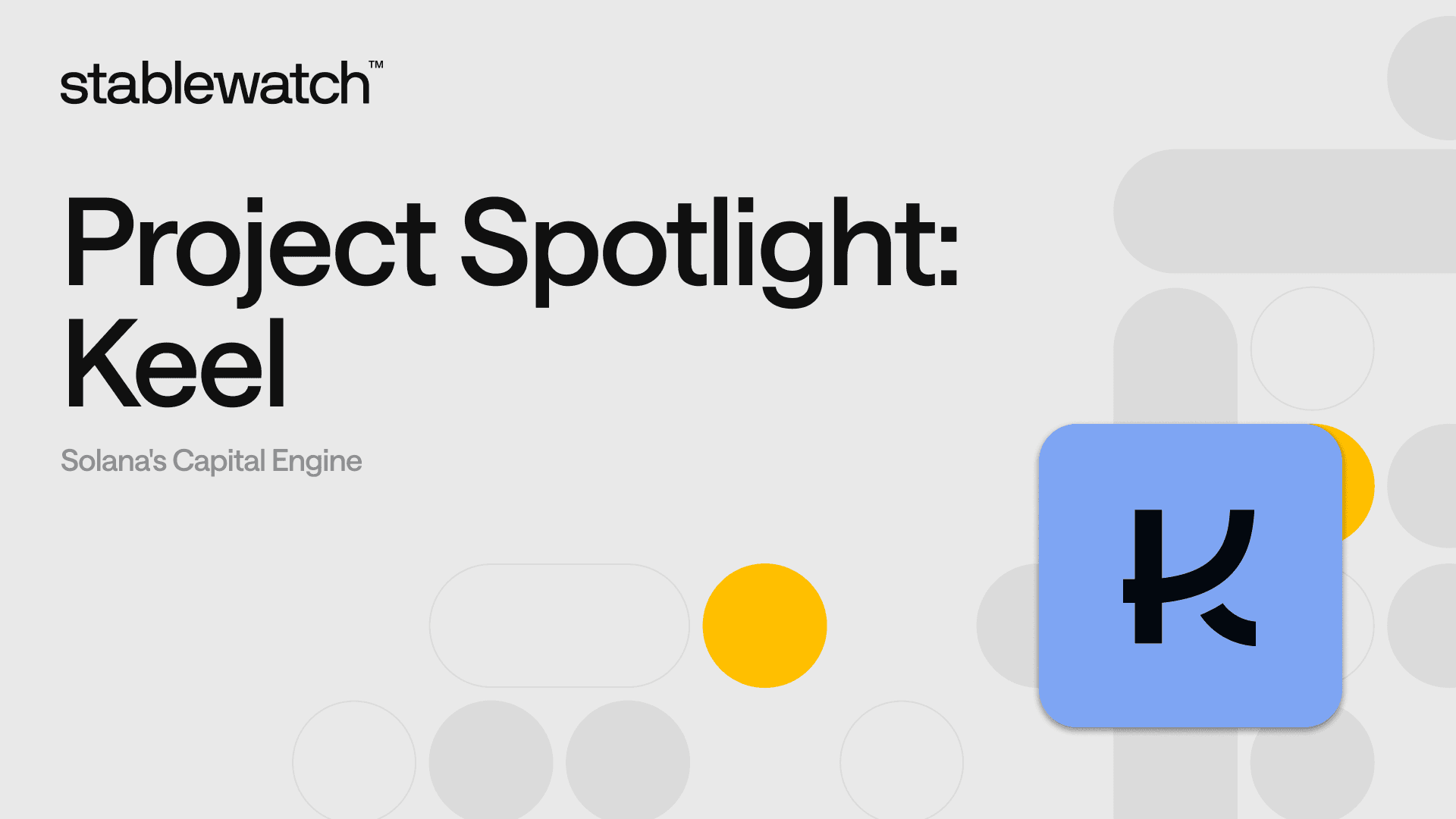
Project Spotlight: Keel
Keel: Solana's Capital Engine Introducing Keel Keel is an automated capital engine that operates within the Sky Protocol (formerly MakerDAO) agent framework, in a similar manner to current agents Spark and Grove. Keel aims to become Solana's largest onchain balance sheet while pioneering the infrastructure needed for tomorrow's tokenised economy. Keel currently has a roadmap to deploy up to $2.5 billion into the Solana ecosystem, ramping up over coming months. "Keel was founded on the belief

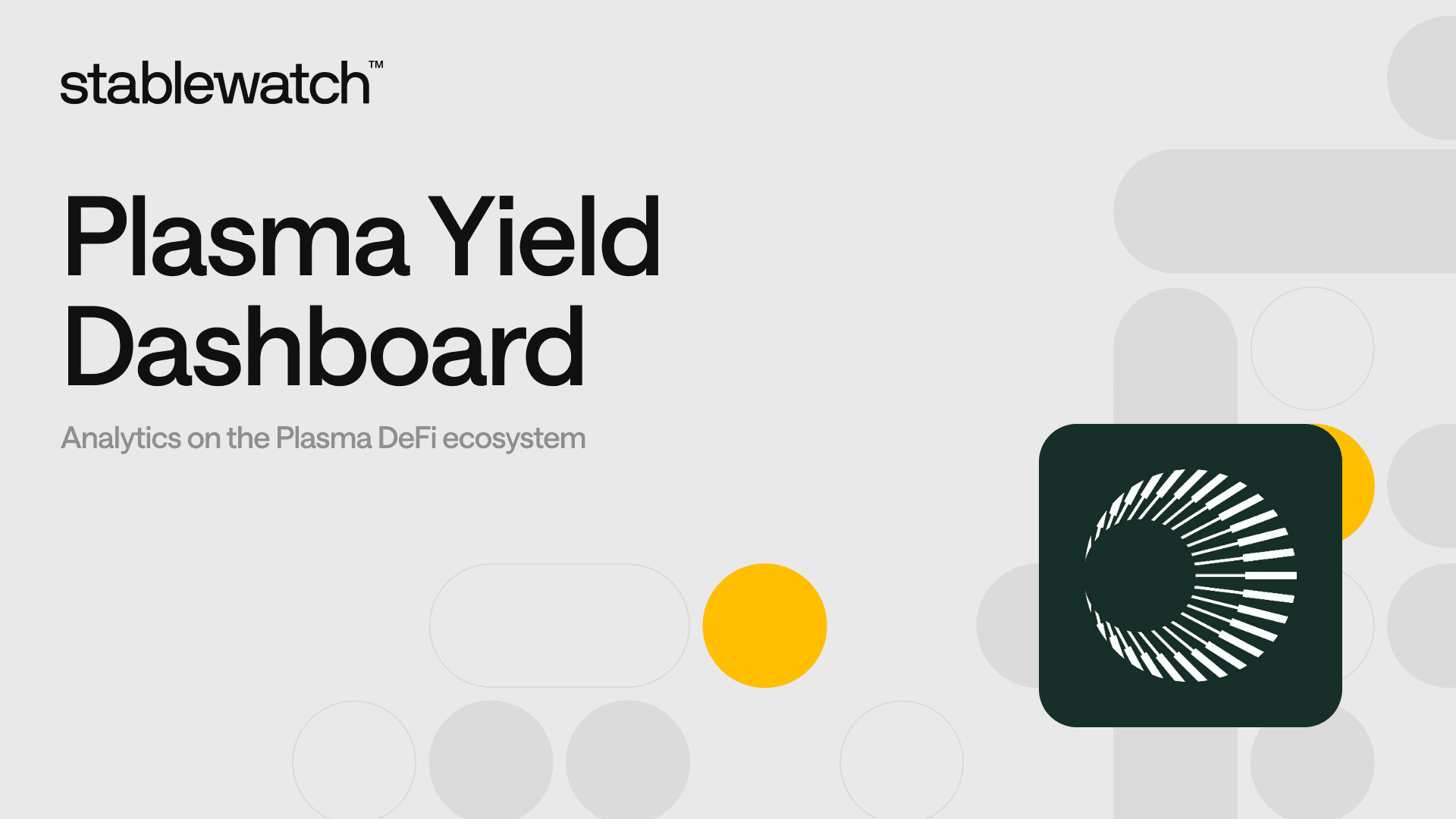
Stablewatch Yield Dashboard For Plasma
Plasma mainnet is upon us, and with that, the wide array of yield opportunities that have launched on the chain become available for mass participation. These protocols will make the backbone of the yield ecosystem on Plasma, facilitating capital flow from holders of stablecoins to the best risk adjusted yield opportunities available. Stablewatch in partnership with Plasma has developed a dedicated yield dashboard for the ecosystem, to allow users to easily compare stablecoin yield. The benefit


Project Spotlight BUIDL
The BlackRock USD Institutional Digital Liquidity Fund (BUIDL) is one of the foremost examples of the amazing innovation that can occur as a result of the nexus of TradFi and DeFi. Launched in March 2024 by BlackRock, the world's largest asset manager, and tokenized by Securitize, BUIDL is a regulated, on-chain investment vehicle designed to provide institutional investors with a compliant and stable source of U.S. dollar yield. It has had a quick ascent to a TVL of more than $2.3B and has becom

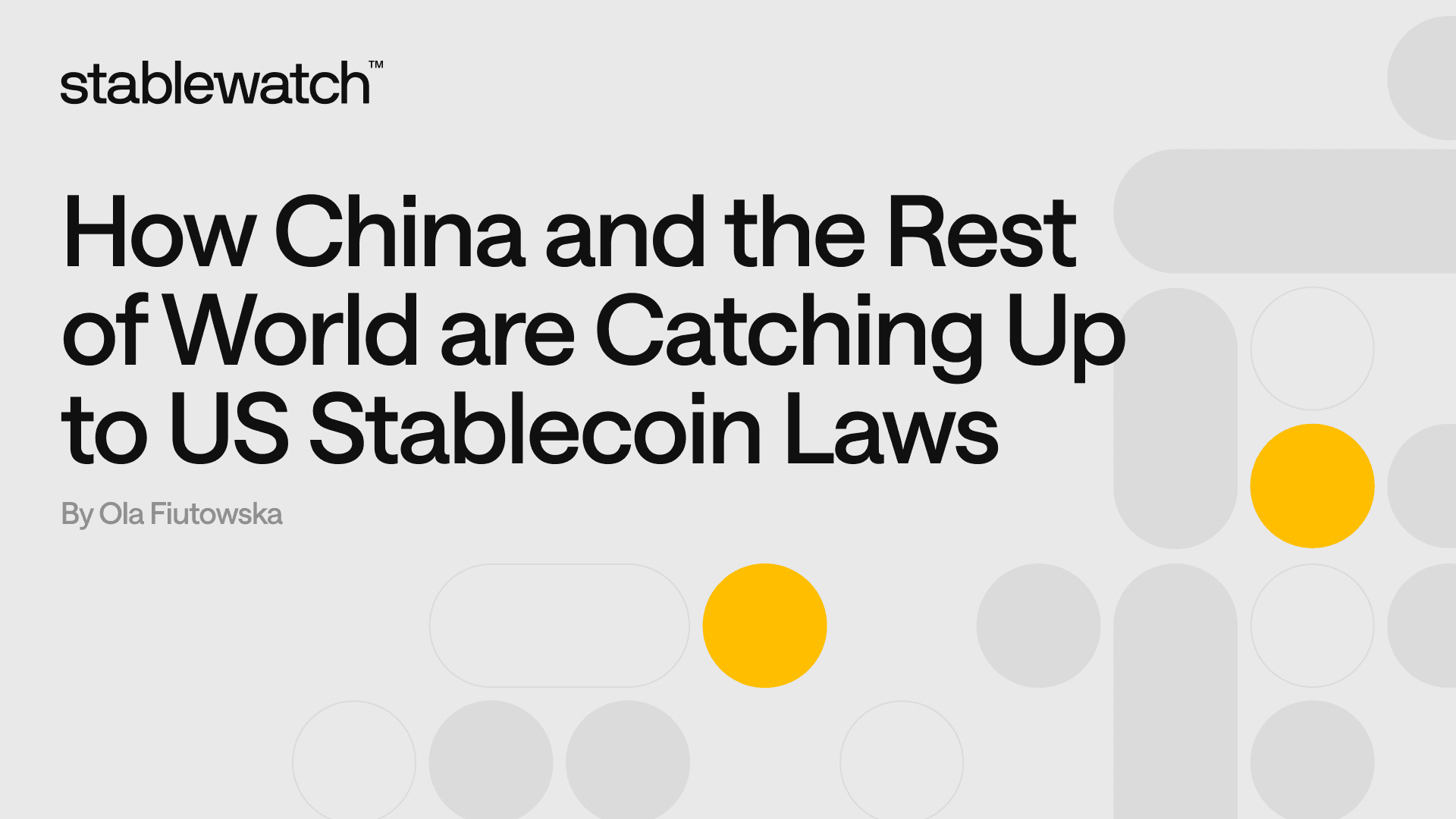
How China and the Rest of World are Catching Up to US Stablecoin Laws
This summer, the US has enacted the GENIUS Act, its first federal stablecoin law, setting clear rules for payment stablecoins in the US. With this regulatory “blessing”, the tech firms followed fast, with recent news of Stripe and Circle announcing launching their own L1s, dedicated for stablecoin payments. Alongside MiCA, the GENIUS Act makes it apparent that crypto is becoming more and more embedded in the “everyday” financial system. Other jurisdictions now face pressure to catch up. China


Project Spotlight: Reservoir
Reservoir has emerged as a heavyweight among DeFi yield bearing products, the protocol has to date amassed a TVL of $197m since its launch in November of 2024. It currently ranks as the 14th largest protocol on Stablewatch in terms of yield paid out (YPO) for just the ERC-20 version of their savings product, a notable feat. In its essence Reservoir is an onchain capital allocator having no native yield generation mechanism, nevertheless at this the protocol excels. Combining crypto backed, RWA

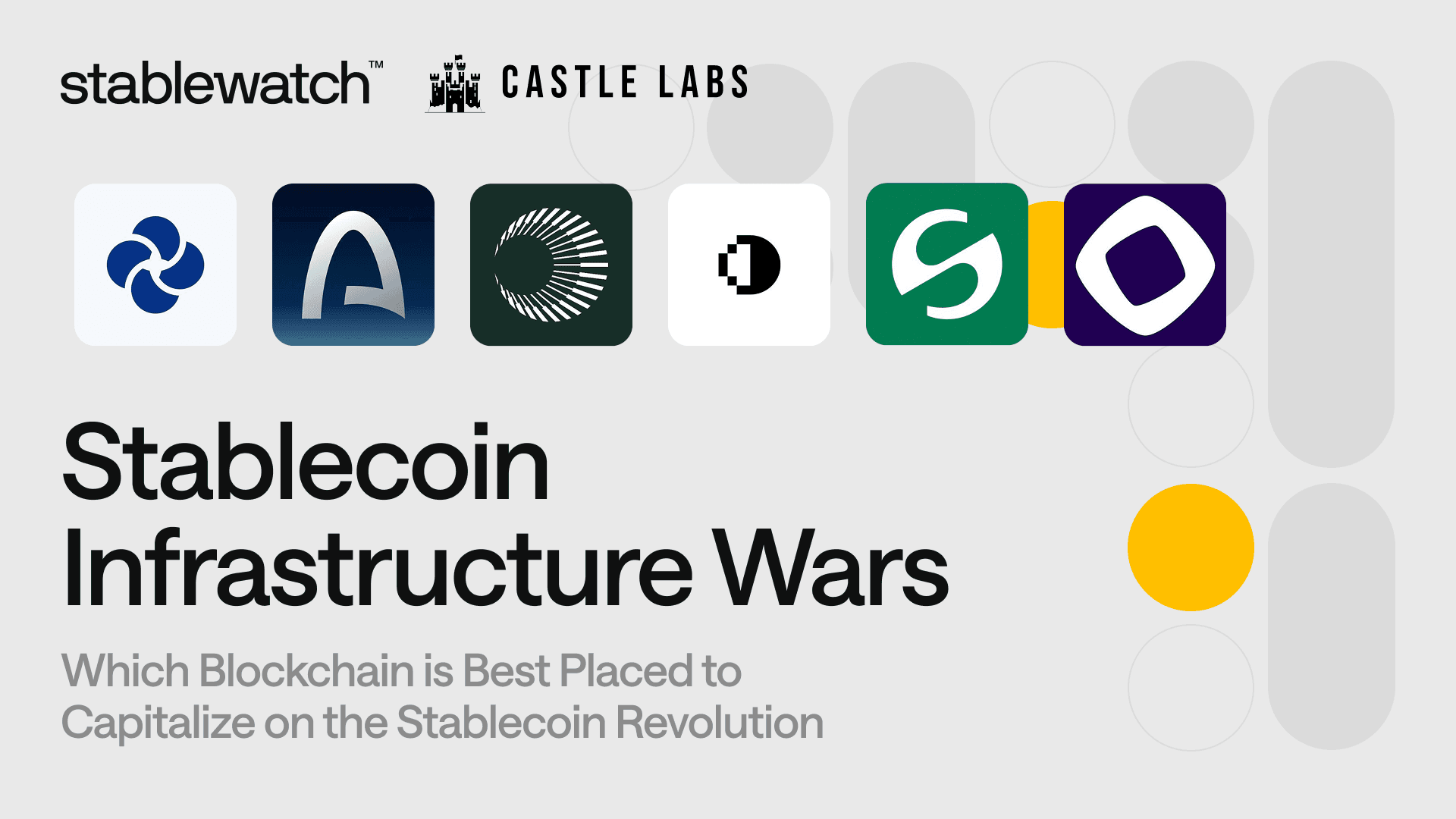
Stablecoin Infrastructure Wars
This article was written in collaboration with @Castle_Labs. Written by Gleb and Atomist. Abstract Stablecoins are dominating headlines throughout 2025. This leaves us wondering, which blockchain network will house and facilitate this asset class? As tokenised dollars continue to be increasingly accepted and regulated, five upcoming Layer 1 blockchains are seeking to join the race and compete against established stablecoin networks such as Ethereum, Tron, Solana and Base. These are Plasma,


GHO Project Spotlight
Aave’s native stablecoin, GHO, is establishing itself as a notable contender in the yield-bearing space, a trend reflected in the metrics of the Stablewatch Yield Bearing Stablecoin dashboard. Since its July 2023 launch, it has seen steady growth, reaching $335M total supply across more than 5,700 current holders. This has been in part due to the remarkable success of its issuer, the lending platform Aave, which has recently reached №38 when compared to US Banks by deposit size. However, GHO in

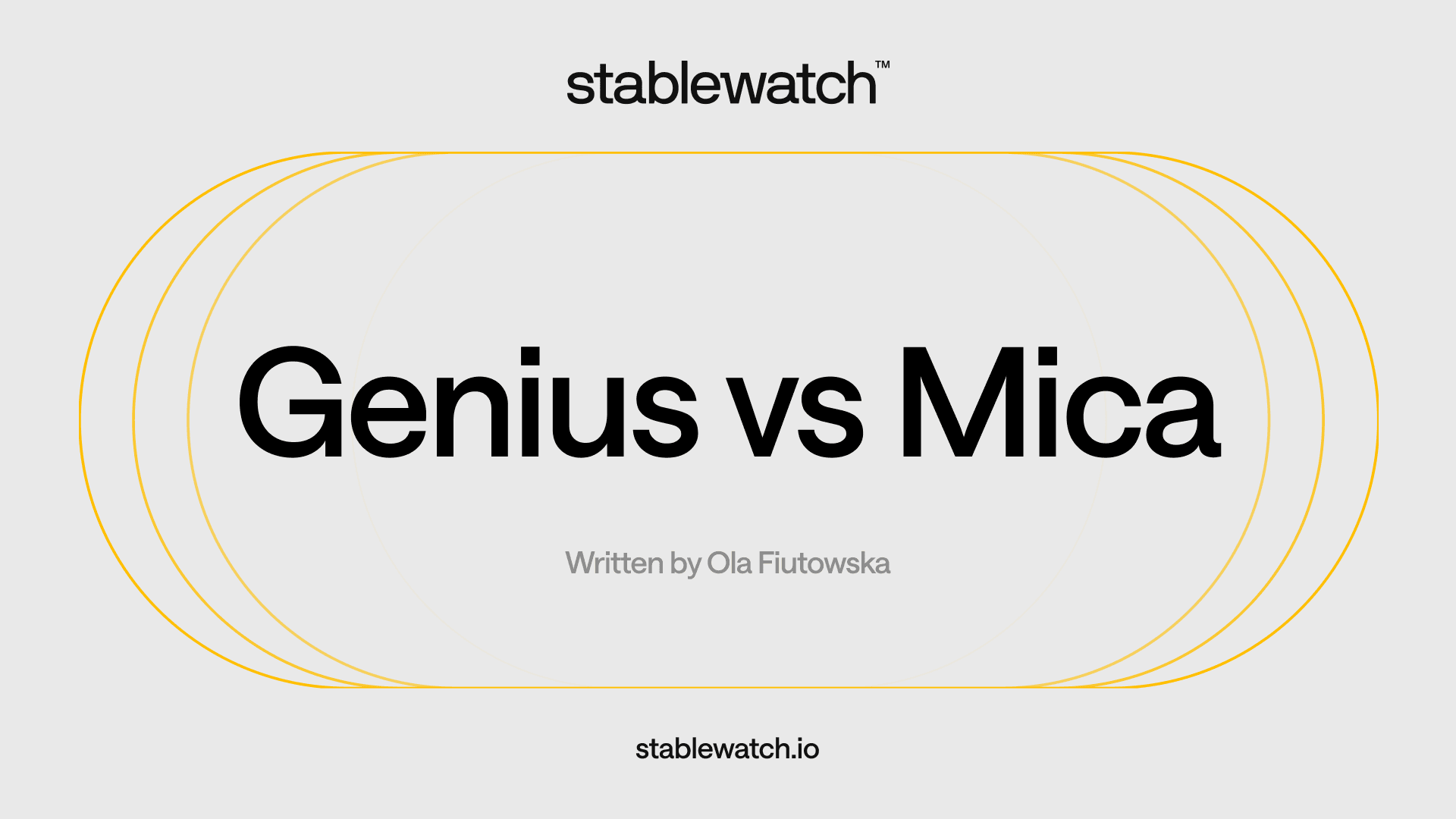
What Stablecoin Users Should Know: Yield, Issuers, and the Legal Line in GENIUS vs MICA
The GENIUS Act (US first stablecoin bill) was signed into law on Friday, July 18. The Act establishes the first US federal framework for payment stablecoins (read more about the Act in our blog post here). In parallel, the Congress has advanced the Crypto CLARITY Act, a broad-encompassing market structure legislation clarifying the regulatory borders of what constitutes a security, commodity, digital collectible etc, now awaiting voting in the Senate. Meanwhile, across the Atlantic, MiCA regulat


Giza Project Spotlight
Humanity is burdened by two fundamental limitations, time and cognitive capacity. Managing capital effectively is a constant drag on both of these resources that are already in scarce supply, particularly among the most productive members of society. It is no wonder that the market size for wealth and asset management is $2 trillion+ according to McKinsey & Company. Addressing this challenge is Giza Protocol, the subject of today’s project spotlight. By democratising access to financial intellig


Debasement Benchmarking Your YBS Portfolio
There is a severe lack of education in the investment community about the rate at which dollar denominated assets lose value. Monetary debasement and the associated inflation rate is a hidden tax that is placed on all participants within fiat currency systems. “The arithmetic makes it plain that inflation is a far more devastating tax than anything that has been enacted by our legislature” - Warren Buffet “Of the roughly 750 currencies that have existed since 1700, only about 20% remain, and o

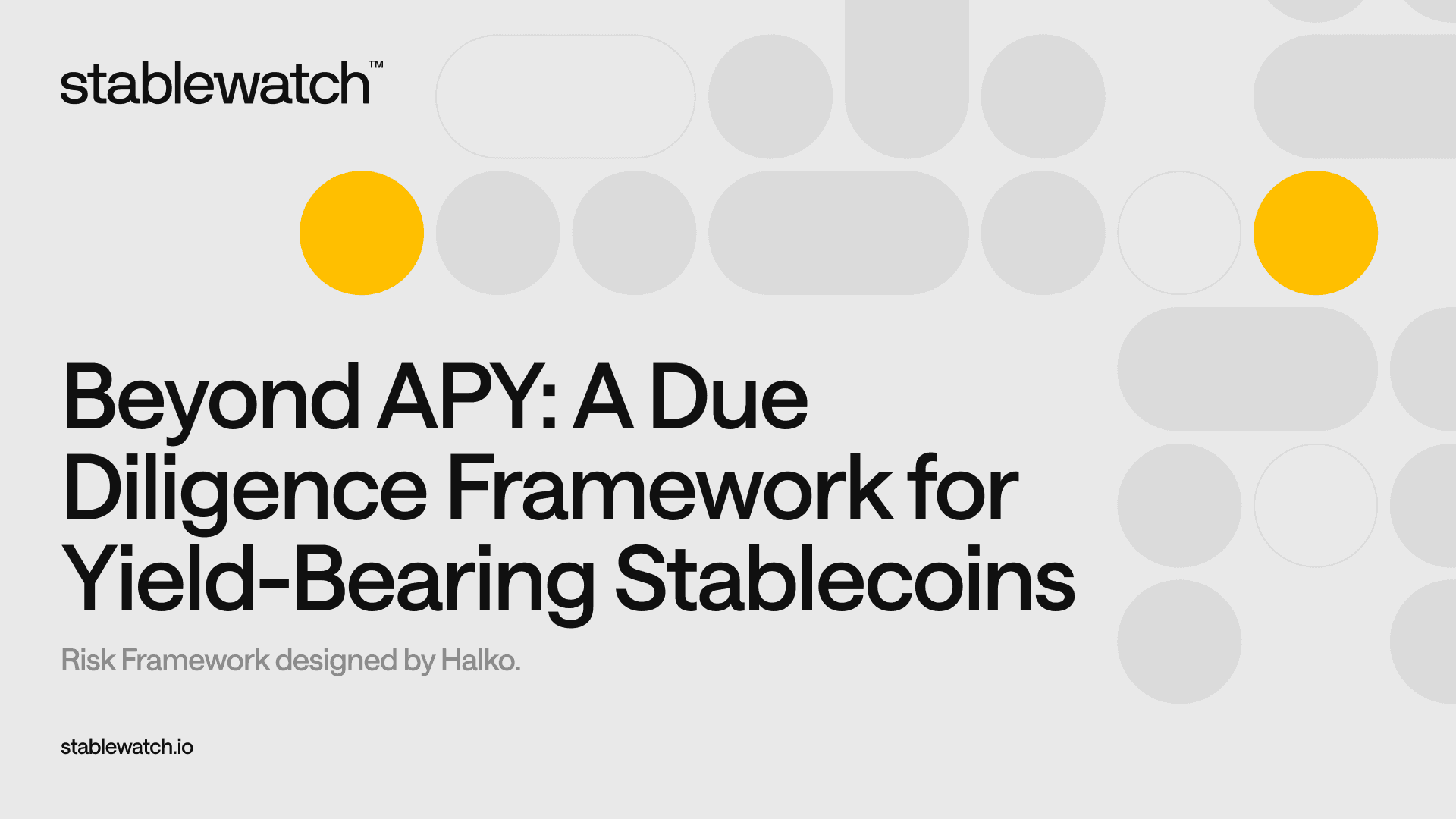
Beyond APY: A Due Diligence Framework for Yield-Bearing Stablecoins
Evaluating the Yield Premium in a Novel Asset Class Yield-bearing stablecoins (YBS) have emerged as a prominent decentralized finance (DeFi) asset class of 2025. Combining the price stability of a fiat-pegged asset (implying there is no downside) with a native yield (essence of DeFi). This creates a compelling proposition for investors - getting paid to hold dollars. Moreover, thanks to the blockchain guarantees, you can verify everything, no risk of someone providing fake data. But is it so?


Project Spotlight: Perena
The most prevalent issue within the stablecoin landscape is the fragmentation of liquidity. With new variants of tokenised USD seemingly launching daily, each version becomes significantly less valuable due to the increased cost of swaps and division of integrations. Enter Perena who aims to tackle these capital inefficiencies specifically on Solana by trying to create a unified liquidity layer for both DeFi native and institutional users of stablecoins. In addition to this, Perena seeks to make

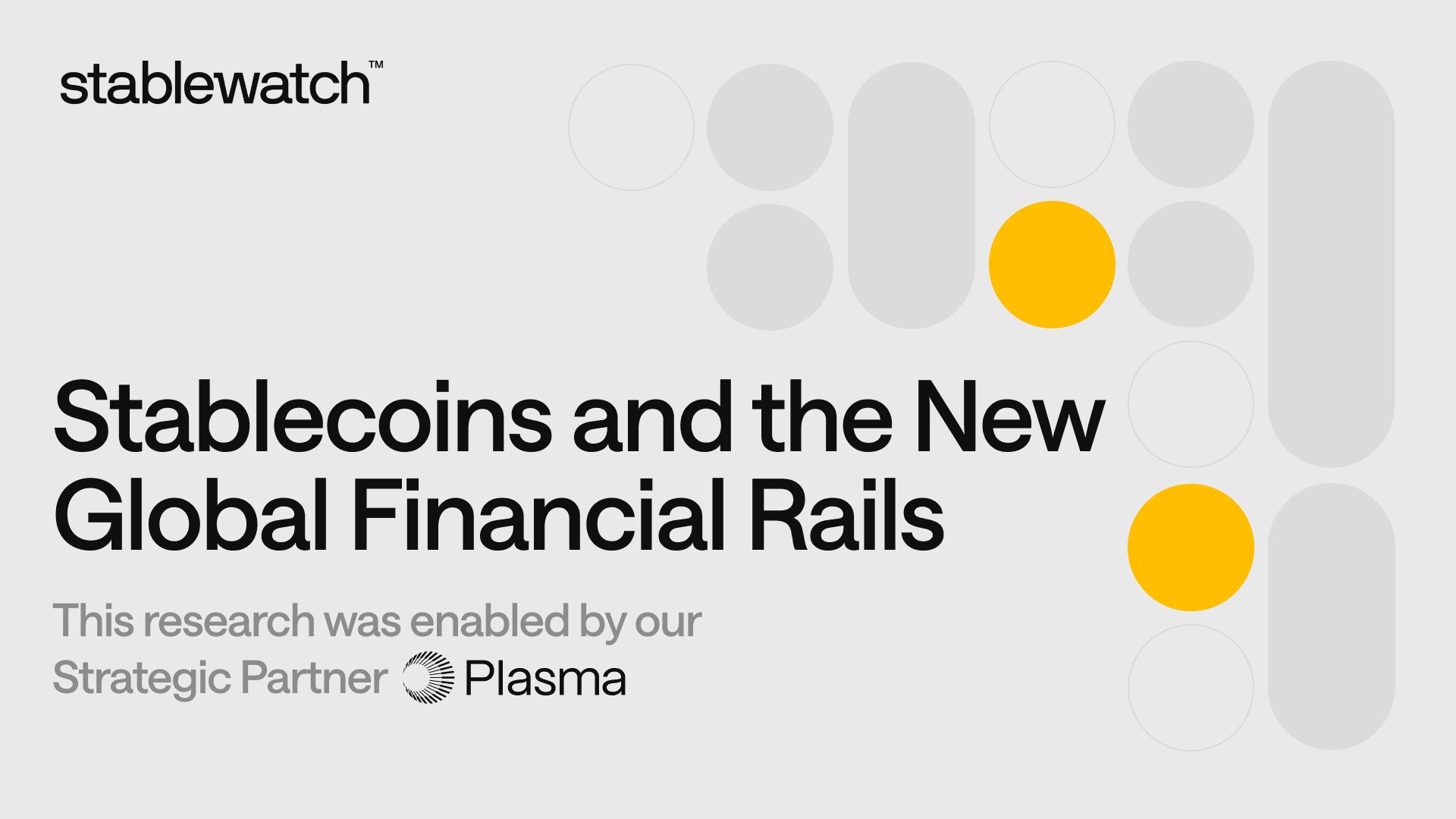
Stablecoins and the New Global Financial Rails
This research was possible thanks to our Strategic Partner - Plasma The global financial system currently runs on decades-old infrastructure, sustaining frictions that act as a tax on economic activity - a problem particularly prevalent in the emerging markets. In response, new financial rails are organically emerging on public blockchains, utilizing stablecoins as their native medium of exchange. This article explores how stablecoins are solving the problems of cost, speed, and access. We exam


Plasma XPL Public Sale: Behind the Data
The Plasma XPL public sale, launched on 17th and set to end on the 28th of July, has been a resounding success, so far raising $66,237,736 in cumulative sales across 2195 unique addresses, with an average investment of $30,177 per participant. The sale allocates 1 billion XPL tokens (10% of total supply) at a $500 million fully diluted valuation. A comprehensive transaction analysis revealed the temporal distribution of participation, with front-loaded momentum typical of high-demand launches:

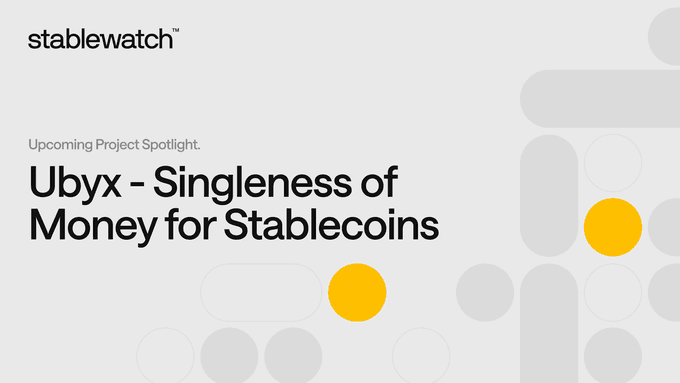
Ubyx - Singleness of Money for Stablecoins
Having recently launched their whitepaper (March 2025) Ubyx has made waves across the stablecoin ecosystem. This article will give you an overview of their novel approach to solving one of the industry’s most prevalent issues. Something that has played a large role in stablecoins not achieving mainstream adoption – singleness of money. Ubyx was founded by Tony McLaughlin an ex-TradeFi executive, holding many accolades in the digital payments space, having been the originator of the Regulated Li

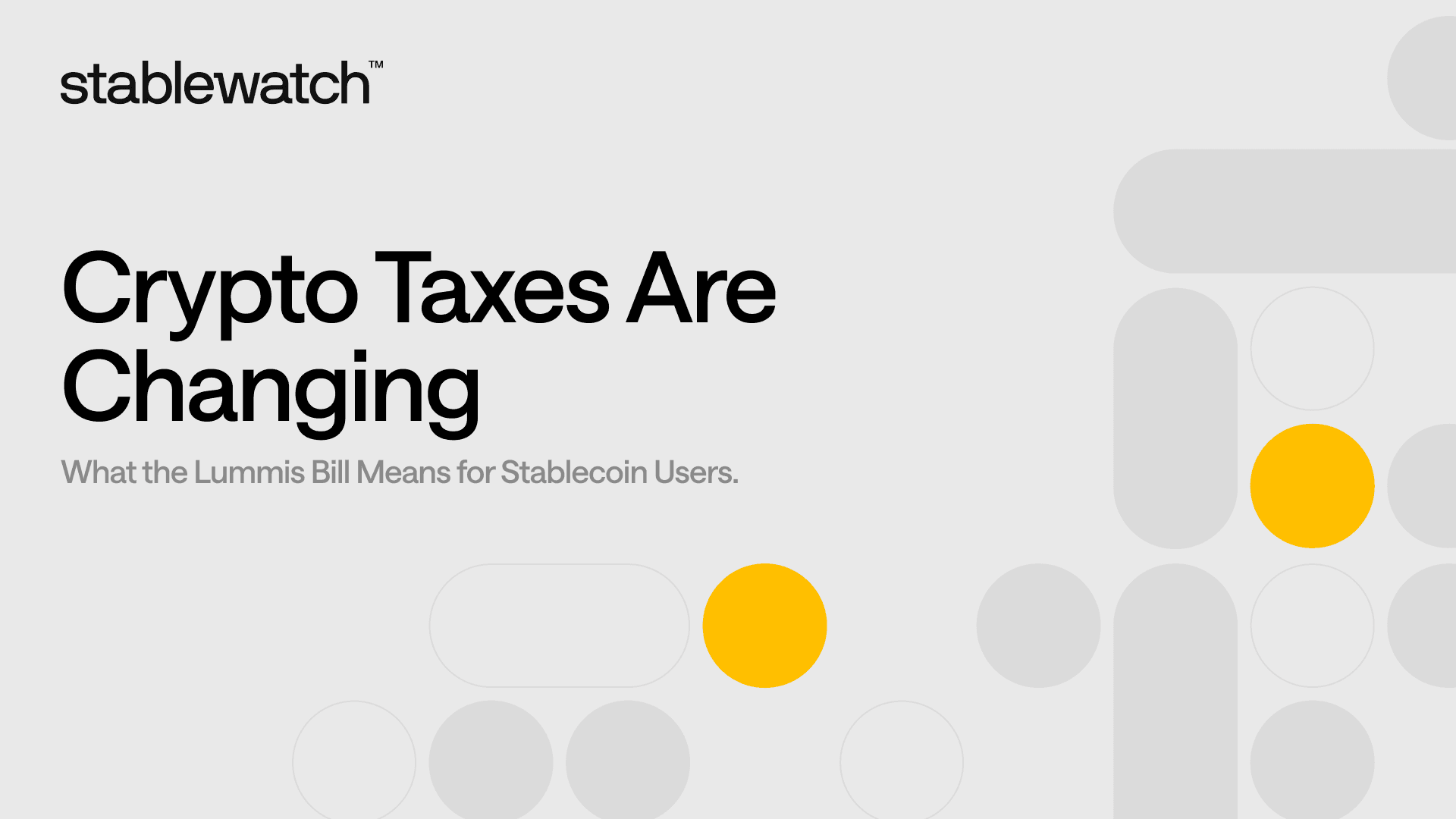
Crypto Taxes Are Changing: What the Lummis Bill Means for Stablecoin Users
A new US Senate Proposal could significantly change how everyday crypto users are taxed. Under the bill introduced by Senator Lummis on July 3, 2025, payment stablecoins would be treated by the IRS as cash equivalents, and excluded from de minimis exemptions applicable to other digital assets. The bill also proposes to defer taxes on staking and mining rewards until sale, but does not impact taxation of yield coming from YBSs (yield-bearing stablecoins). Here’s what stablecoin users need to know

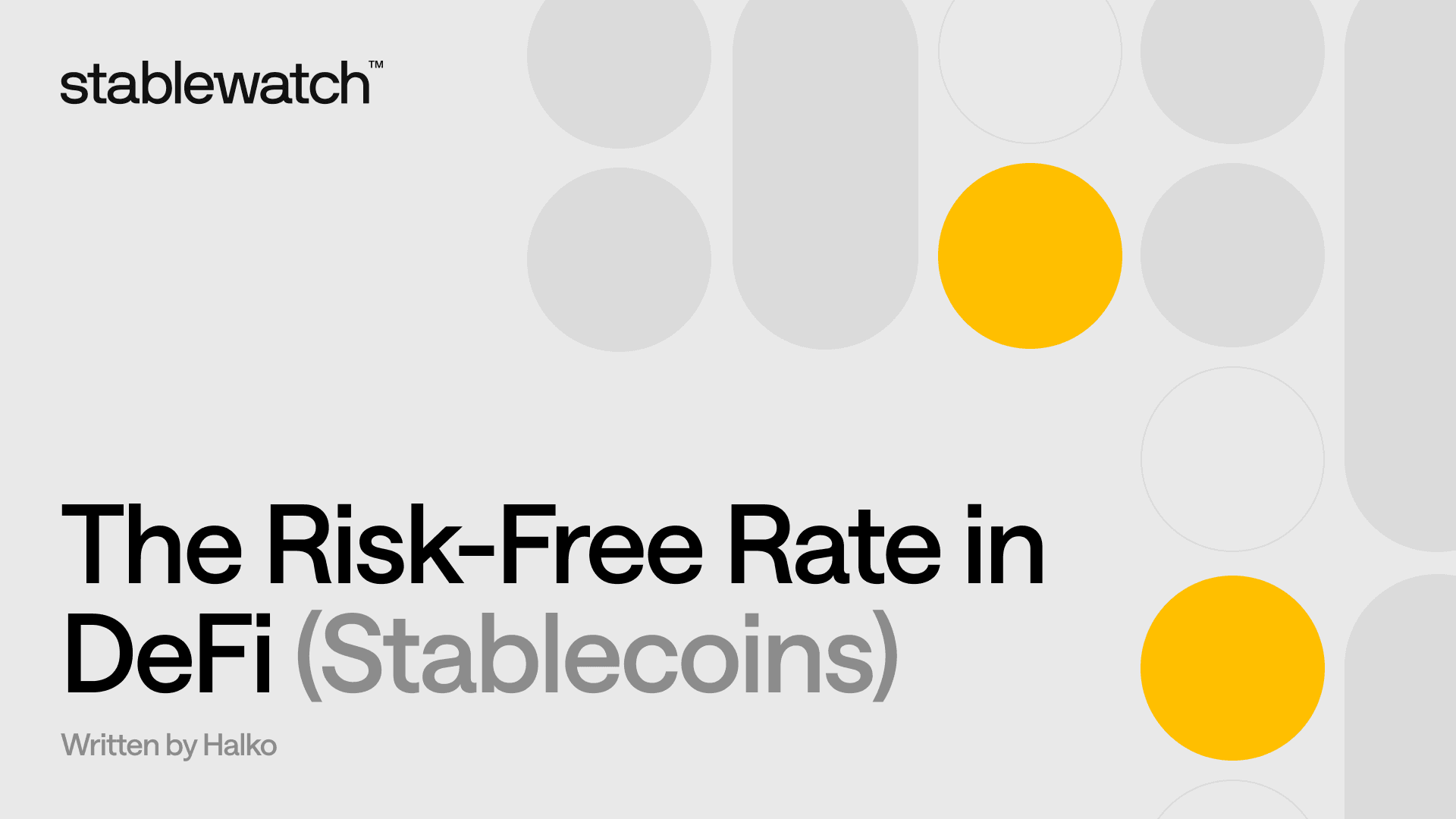
The Risk-Free Rate in DeFi (Stablecoins): A 2025 Analysis
The Risk-Free Rate in DeFi In traditional finance (TradFi), the “risk-free rate” is the most commonly used benchmark of the return on investment with zero chance of losing the principal. Think U.S. Treasury bills (T-bills), backed by the U.S. government’s ability to print dollars at will (this was also the original, sacred Bitcoin’s bull case). These government bonds are considered low risk because they are bonds issued by the US government, providing a baseline for evaluating other investments
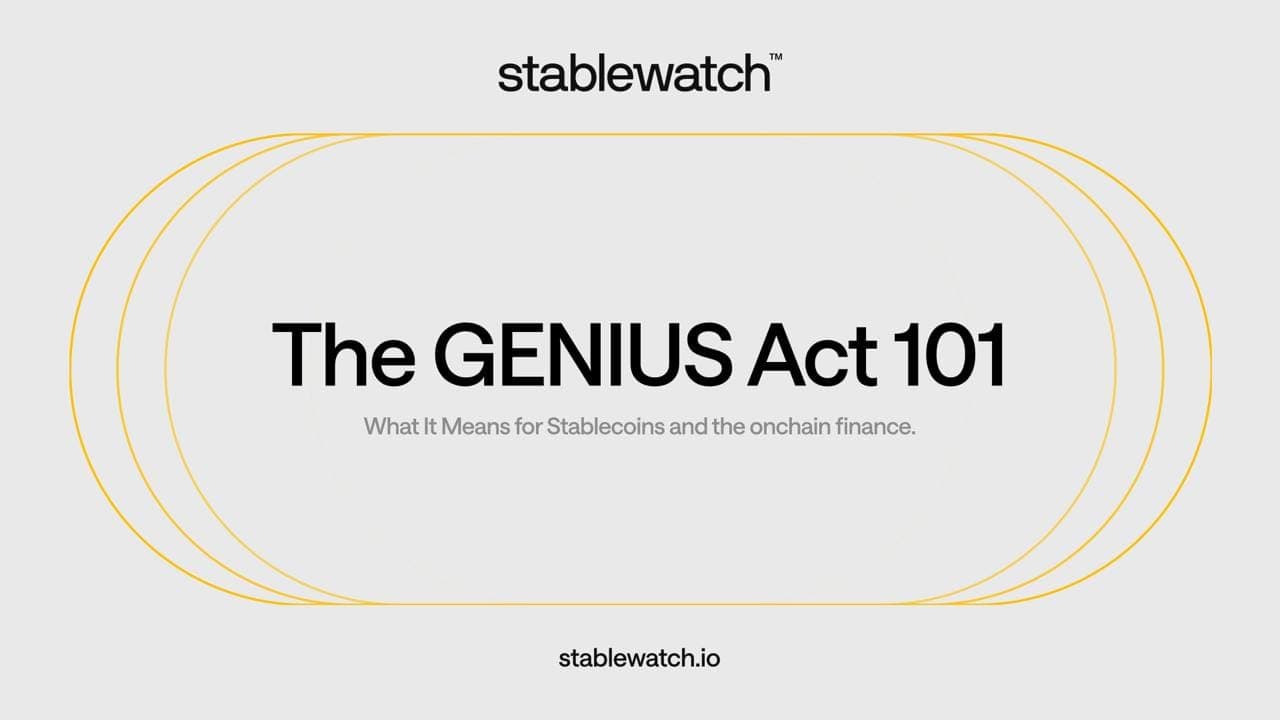
The GENIUS Act 101: What It Means for Stablecoins and the Onchain Finance
In a milestone move for the US crypto policy, on June 17, 2025 Senate passed the Guiding and Establishing National Innovation for U.S. Stablecoins (GENIUS) Act. It’s the first comprehensive federal framework for stablecoins. The key question is whether such a cautious approach addresses the complex realities of onchain finance and DeFi. Spotlight on Payment Stablecoins. After years of federal regulatory limbo and patchworked state-level approaches, the US is finally moving towards hard-coded

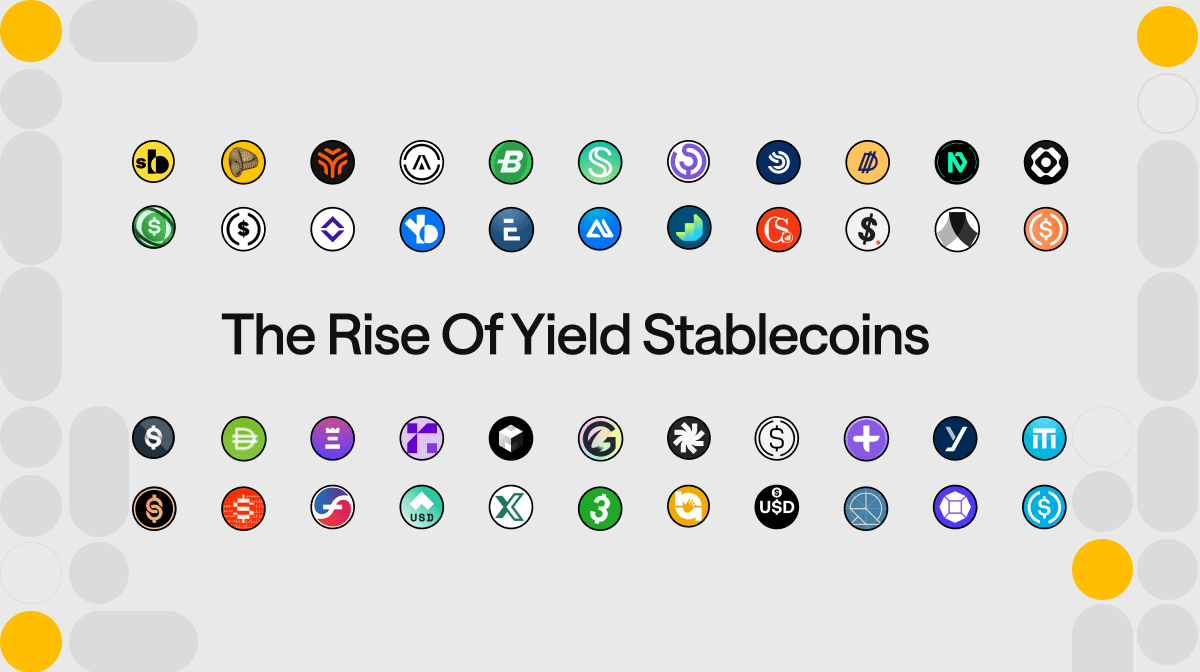
The Rise of Yield Stablecoins
Yield-bearing stablecoins are on the rise. You can see this in different metrics tracked on our site: the total market capitalization of yield stablecoins, the number of such products launching over the past months, and the total yield paid out to users. Let’s dive into the data. Yield stablecoins are quickly emerging as digital alternatives to traditional money market funds and bank deposits. By offering a stable value and generating passive income, these assets are attracting both instituti

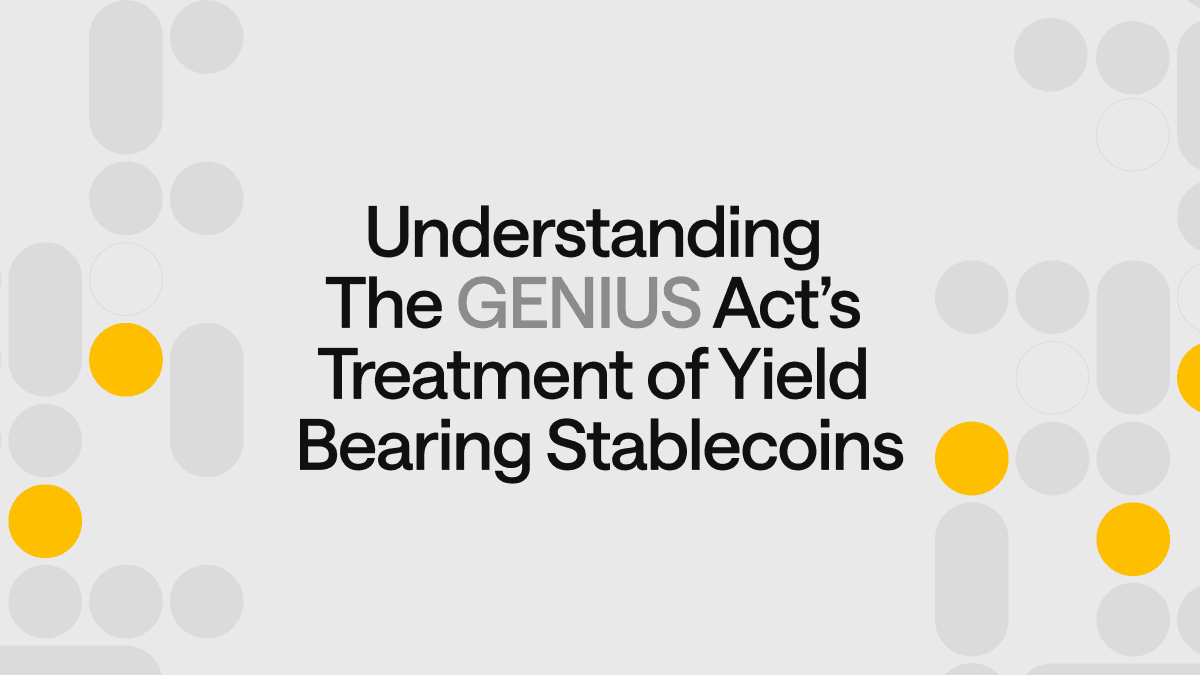
Yield Outlawed. The GENIUS Act’s Prohibition on Yield-Bearing Stablecoins.
The GENIUS Act, passed by the Senate on June 17, 2025, prohibits permitted payment stablecoin issuers from offering interest, excluding yield-bearing stablecoins (YBS) from the payment framework and placing them under securities or other financial regulation. While intended to safeguard stability, some argue it may constrain innovation and shift opportunity offshore. As the GENIUS Act advances towards becoming law, having passed the Senate on June 17, 2025 with a 68 to 30 vote and now awaiting

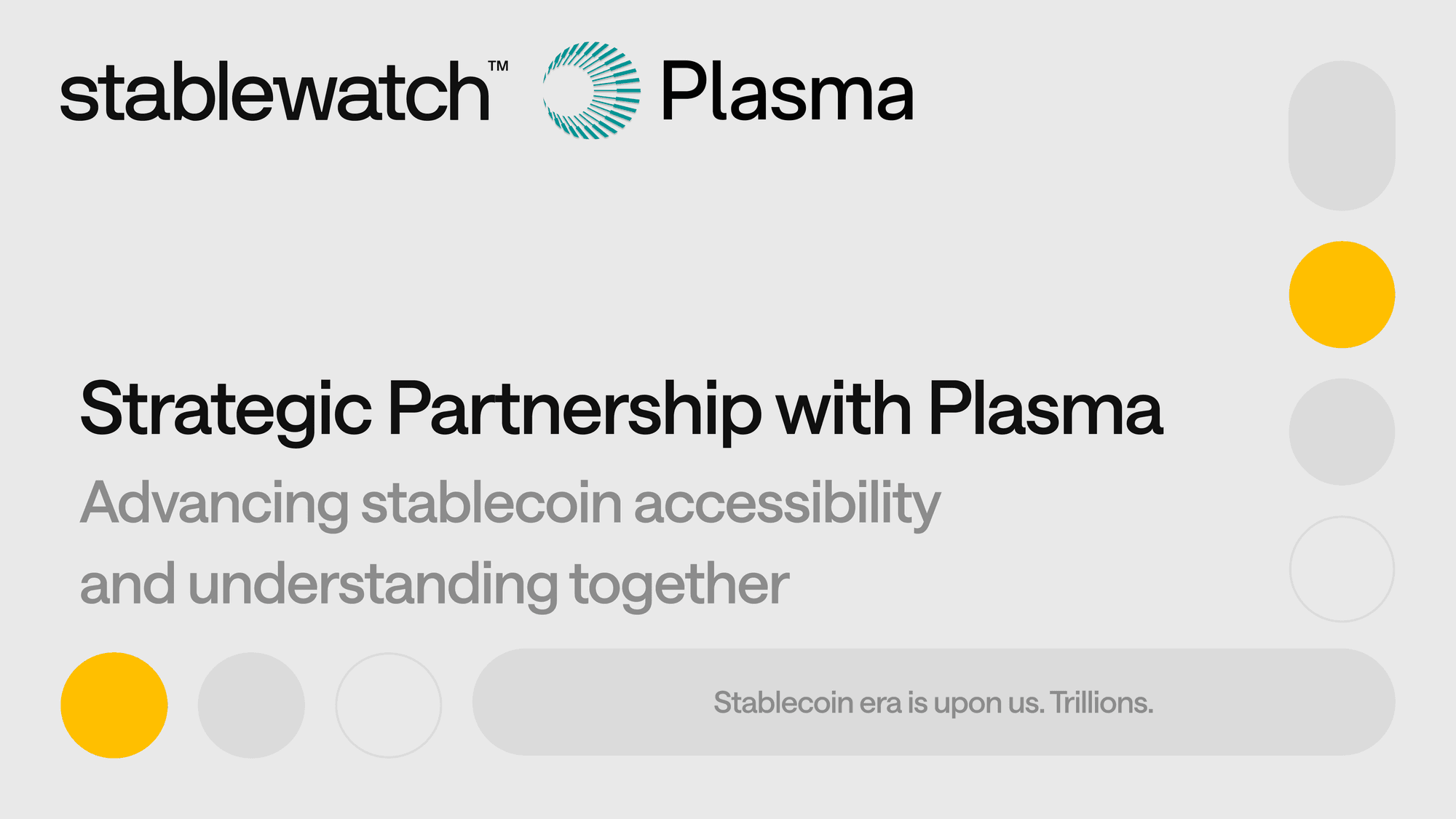
Stablewatch x Plasma: A Strategic Partnership for the Stablecoin Era
Stablewatch is excited to announce our strategic partnership with Plasma, a collaboration that represents a pivotal moment for our platform and the broader stablecoin ecosystem. This alliance will empower the Plasma network with comprehensive, high-quality stablecoin data while enabling both companies to support pioneering founders building the future of digital payments. Our shared mission is to deliver unparalleled data clarity through a unified, accessible platform. Why This Partnership Mat

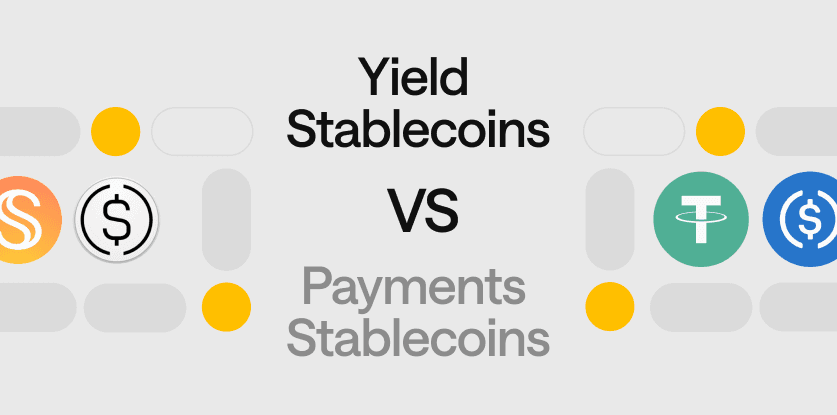
Stablecoins vs Yield Bearing Stablecoins: The Two Types That Matter
Not all stablecoins are the same. In practice, stablecoins serve two core purposes: Moving money → payment stablecoins Growing money → yield stablecoins This simple distinction is by no means exhaustive, yet it is helpful and can be illuminating for many. It should guide how we design for adoption, user experience, regulation, and use cases. Other, more robust classifications (by collateral, peg mechanism, decentralization, or regulatory status) still matter. However, none of them reflect the


Money Supply Metrics: Comparing Traditional Currency & Stablecoins
Money Supply Metrics: Comparing Traditional Currency & Stablecoins In the rapidly evolving financial landscape, stablecoins have emerged as a significant digital alternative to traditional currency. At stablewatch, we've just launched a new feature that visualizes how stablecoins compare to the USD supply over time. To fully appreciate this comparison, it's essential to understand how economists and central banks measure and track money supply, as well as how different types of stablecoins fit

